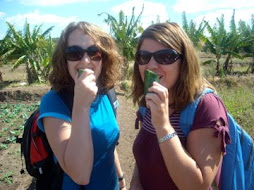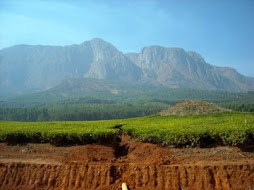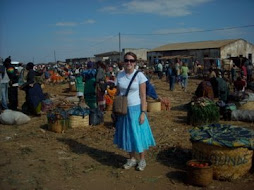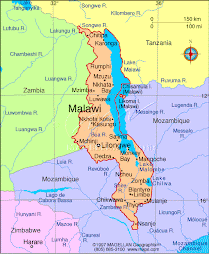I decided to post my final paper for my trip and undergraduate research in Malawi.
Education, Sustainable Agriculture & AIDS Prevention:
The Keys to Progress in Malawi
Krista Patrick, August 2008
It's easy to see why Malawi is the "Warm Heart of Africa" with its friendly people and warm spirit, but Malawi is also a country that faces many issues challenging the country's wellbeing. While I'm not an expert on issues in Malawi, during my time there I was able to learn a great deal about the people and the issues they face. The keys to progress in Malawi are to increase the formal education of citizens, promote sustainable agriculture year round and spread AIDS awareness throughout the country despite cultural norms and traditions.
Education in Malawi
Formal education for children in Malawi starts at age six. Not all students start school at this age, but this is when government-funded primary education begins. Primary school includes eight years of education from "Standard 1" to "Standard 8". At the end of Standard 8, students sit for an exam called the Malawi National Examination Board. In order to be eligible for secondary school, students must pass this exam and be selected. Even if students pass this examination, there is no guarantee that he or she will be selected for secondary school. Government funds are set-aside for students that are selected to attend secondary school.
The education system in Malawi faces many struggles including large class sizes, insufficient supply of teachers, limited supplies, inadequately trained teachers and inefficient curriculum. Our main purpose in Malawi was to teach in a primary school in Domasi near Zomba. Each of us was placed in a classroom ranging from Standard 3 to Standard 7. We learned firsthand about the flawed but perhaps promising education system in Malawi. Each classroom had scarce supplies and needed renovations badly. With crumbling walls, little lighting and cracked chalkboards, it was easy to see how students lack the stimulating learning environment they deserve. Our classrooms were filled anywhere from 70 to 120 children. On an average day, at least 10 children would be missing, but there was no regulation on "make up work" or attendance policies. Some  classrooms did not even have adequate seating or any seating for that matter.
classrooms did not even have adequate seating or any seating for that matter.
According to US AID Malawi, when the government abolished school fees for primary schools in 1994, there was a sharp increase from 1.9 million students to 3.2 million with an average student-teacher ratio of 72 to 1 (USAID). This alone caused major problems for the school systems, especially with an inadequate amount of teachers. While we would think that more students attending school would be a positive change for Malawi, all of the inadequacies of the education system have caused more problems than benefits. The overall school quality is low. 80% of schools cannot meet the minimal standards for reading and math (USAID). We saw firsthand in our classrooms the reading and math levels of our students. While some excelled more than others, it would be virtually impossible for a student who is struggling to receive one on one attention from a teacher. With the average class size of over 70, it's just not possible.
Another severe issue is the dropout rate. About 60% of primary students drop out before completing grade 8. The literacy rate is also 63%, and with a high dropout rate, many students will never receive the literary skills they need to excel in jobs. During our class meetings, we discussed some of the reasons for such high drop out rates. A few of these reasons included conflicting beliefs following village initiations, female students and janitorial responsibilities, family obligations and female pregnancy/early marriage. We had extensive discussions on female dropout rates opposed to male rates due to the janitorial responsibilities that the young girls are required to perform like cleaning classrooms and toilets. Additionally, due to the limited spots for secondary school, some families choose which child will continue through school. Often this is the child who has excelled the most in school, and families need the other children for work in the villages and with their crops. The literacy rate is 63%, and this is obviously contributed much by the drop out rate of children in primary schools.
The Ministry of Education has begun to reform the curriculum in Malawian primary schools. According to their website:
"The vision of the MoEST in the Government of Malawi is to attain a stage in the educational development where all citizens shall be functionally literate and numerate, shall acquire relevant survival skills and knowledge at a functioning level of competence, shall be healthy and prosperous, shall possess and utilize communication, interpersonal skills and full tolerance of diversity for amicable and beneficial integration in free and peaceful Malawi and shall support socio-economic cultural and industrial development within a culture of peace."
Although this may be the vision for the schools of Malawi, we saw little results in the classroom. The new curriculum (that most schools are just beginning to use) does enforce more skills and knowledge assessments in earlier grades rather than waiting until Standard 8. This continuous assessment will allow teachers the ability to see the deficiencies or advancements of students before moving on to higher Standards. Also, rather than studying 12 subjects from Standard 1, the new curriculum starts students with 7 subjects. Standards 5 through 8 will study 9 subjects. In our Standard 6 classroom, we saw some of the integration of the new curriculum, but students are still lacking solid literary and language skills. While some students were effective writers and communicators, others were unable to complete basic sentences with correct spelling, meaning and punctuation or answer a simple question. Most of the work the students completed was checked for completion not accuracy. There is just not enough time in each class for the teacher to work with individual students. Also, "star students" are surrounded by other "star students" while students falling behind the achievement curve  are placed with other students in similar circumstances. This just furthers their failure with no support from achieving peers.
are placed with other students in similar circumstances. This just furthers their failure with no support from achieving peers.
Continuous assessment may help with students achieving the standards needed to move forward in their education, but the teachers have to have the training necessary to teach what is required. Simple steps like integrating high-achieving students with those who need more help may assist students in the classroom. During my teaching, I would check a student's work in a learning group, and if he or she had the work correct, I'd have him or her explain it to the rest of the group. If the student needed help, I would assist. Then, I could work with other students who needed individual help. Students also need a stimulating environment with adequate supplies. The government has to provide better textbooks and materials for the students. Additionally, instilling work ethic and equal rights among students with school chores would help with issues outside the classroom. Young girls are still faced with cleaning the schools while the boys are dismissed from these tasks, but the government is trying to change human rights for women. If they started in the classrooms, it may be an effort that can translate to experiences outside the classroom. I believe the education system in Malawi has a bright outlook somewhere in the distant future, but in order to offer improvements and the education Malawians deserve, many areas must improve.
Sustainable Agriculture
During our first week in Malawi, our group visited "Freedom Gardens" outside Lilongwe. We weren't sure what to expect, but we were pleasantly surprised. Malawi spends about fours months of the year in the dry season. During this time, water supplies are limited and consequently so are food supplies from crops. We saw first hand the arid land, bone-dry rivers and land burning throughout the country. With little water coming in other than through man-made pumps, the water supply limits crop production in the dry season. One would think that this would be a hardship difficult to overcome, but some have found answers and ways to defeat any drought.

Glyvyns Chinkhuntha and his wife started their project in 1982. What started as "madman's" project to onlookers and a ten by ten meter plot of land with surrounding swamp is now a 20-acre property with endless variations of vegetation. It's completely sustainable with dammed fresh water from the rainy season, irrigation throughout the varying crops, no wasted space and a plan for the future. The best way to describe the philosophy of the Chinkhuntha is that they have their own Garden of Eden. They use only what God has given them and the land that is there. They have learned irrigation and how to use everything available to create a sustainable lifestyle. Their property and the sustainability they've maintained are examples that countries with similar farming seasons can use. Even in the dry season, they continue to harvest all that they can. Some of the crops include bananas, sugar cane, maize, cabbage, lettuce, cucumbers, curry, papaya, lemons, onions, limes, chamomile, and much more. With so many crops, six ponds, a dammed river, irrigation systems, storage units and their one pump for drinking water, their work is an outstanding example to other countries with food deficit. Their single pump for fresh drinking water is the only man-made pump on the twenty acres of farmland.
The farming at "Freedom Gardens" is based entirely on organic cultivation with no artificial fertilizers or pesticides. By using natural wastes like manure and compost, the damage to humans and nearby animals can be minimized, and costs are reduced. The irrigation is done through trenches rather than mechanized pumping systems.
"Freedom Gardens" is actually an international initiative for people around the world to become less dependent on corporate food supplies and the importing of foreign foods for survival. The concept is to use one's land to grow necessary crops and create a sustainable lifestyle. There are projects worldwide that have been successful, and this could be the solution for many third world countries and world hunger as a whole. The initiatives of Dr. and Mrs. Chinkhuntha alone show hope for Malawians.
If the techniques mastered by the Chinkhunthas could be applied throughout Malawi, there would be an end to starvation and related issues like infant mortality. Children would no longer be malnourished, and Malawians could have sustainable lifestyles for the future. Their vision is not only encouragement and hope for Malawi and Africa, but also for the world. With so many issues related to pesticide use, we need to move towards a world with organic farming to prevent cancers and other diseases. The Chinkhunthas have already started to spread their message to other Malawians and Africans, and if they continue, solutions to end starvation may be in the future. If Malawians could begin to use at least some of their techniques, a lot of problems could be resolved.
AIDS Awareness and Prevention
AIDS has become widespread in Malawi, and its victims are more than those infected. Although some research has shown that 12% of Malawians are infected with the virus, the entire population has seen its effects. With increasing numbers and damaging lifestyles, Malawians are faced with devastating realities. An entire generation gap has been formed leaving orphans and elderly alike with hardships never before faced.
During our time in Malawi, we met several people who were either infected or affected by the AIDS virus. It's easy to see how the widespread affects on the infected population have affected everyone. On one of our days off, a few of us visited a heavily affected village with a woman who had just returned from the United States. Her name is Jean and she is a Malawian who has devoted the rest of her life to giving back to her village in Malawi. Although she has lived in the U.S. for 30 years, she has taken consistent initiatives to give back to her community and embrace the devastating changes it has encountered in order to help in any way she can. Part of her initiatives have included building a clinic for her village and starting a "Grandmother's Club" for support. The grandmothers (like other grandparents in Malawi) have become the silent victims in the fight against AIDS. AIDS has devastated the generation of their children leaving orphaned grandchildren in grandparents care. The grandmothers in Jean's village find refuge in one another for the hardships they face, i.e. failing health, lack of income and the inability to provide basic needs for their grandchildren to name a few. It's just not getting any easier in Malawi.
The lack of AIDS awareness and education in Malawi is partially to blame for the devastating effects. Malawians are not informed about the consequences of sexual promiscuity, ritualistic practices or sometimes even the source of the virus. In some of our class discussion in Malawi, we discovered that some Malawians believe that AIDS is transmitted through mosquitoes! According to researcher John Lwanda, even some educated university students are unaware of the means for transmission of the disease. Malawians have also stereotyped the disease as "Western" blaming its introduction in the country on westerners (151). Some also believe that sleeping with a virgin can dispel it. The myths vary, but the root of this issue is the lack of education for the people.
The first national AIDS campaign program by the Malawi Ministry of Health was instituted in 1987 (Lwanda, 155). This started after several deaths of civil servants and government employees under President Banda. Since then, there has been a weak national movement encouraging safer sexual practices, but many Malawians still are against condom use and the limiting of time-honored rituals and traditions.
The Malawian government must take greater efforts to educate the population. Even if programming calls for the promotion of condom use, it's necessary to save lives in Malawi. Although clinics are beginning to become available in the country, the government has to at least provide testing for its citizens. It may be taboo now to discuss the disease, but as Jean discussed with us, the more people that share, the more others will learn. Prevention can be spread through simple awareness within families, villages and social circles. Myths about the transmission of the virus and rituals that give a death sentence to innocent children must be dispelled.
Conclusion
There is no simple solution to the problems facing Malawians today, but there is hope for the future. Malawians are strong willed, able and capable of change within their country. The key to each problem is education. Malawians need a sufficiently funded and supplied education system where they can learn and grow academically to become successful citizens within the country. Malawians must learn alternative and sustainable agricultural practices in order to survive in every season and provide for their children. Malawians must also recognize the severity of AIDS and learn how to change habits and traditions in order to prevent any increase in deaths within the country. The key to change is education. If the government continues to develop the education system, educates the population on sustainable agriculture year round and takes a progressive approach to educate the population, we will see positive changes for the future.
References
Lwanda, John. The political culture of the HIV/AIDS epidemic in Malawi. Harri Englund, ed. Democracy of Chameleons: Politics and Culture in the New Malawi. Afterword by Jack Mapanje. Kachere Books, no. 14. Co-published with the Christian Literature Association, Malawi. Uppsala: Nordic Africa Institute, 2002.
Malawi Ministry of Education. (2008). Vision & Strategic Objectives. The Ministry of Education. Retrieved July 28, 2008 from http://www.malawi.gov.mw/Education/Home%20%20Education.htm.
USAID. (2008). Education in Malawi. USAID from the American people, Malawi. Retrieved July 26, 2008 from http://www.usaid.gov/mw/aboutmalawi/education.htm.

 classrooms did not even have adequate seating or any seating for that matter.
classrooms did not even have adequate seating or any seating for that matter.  are placed with other students in similar circumstances. This just furthers their failure with no support from achieving peers.
are placed with other students in similar circumstances. This just furthers their failure with no support from achieving peers. 




